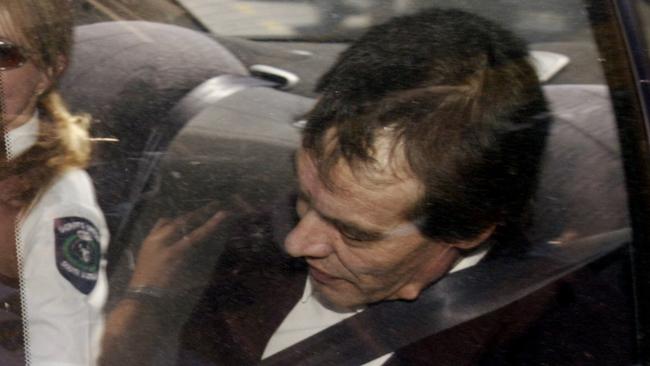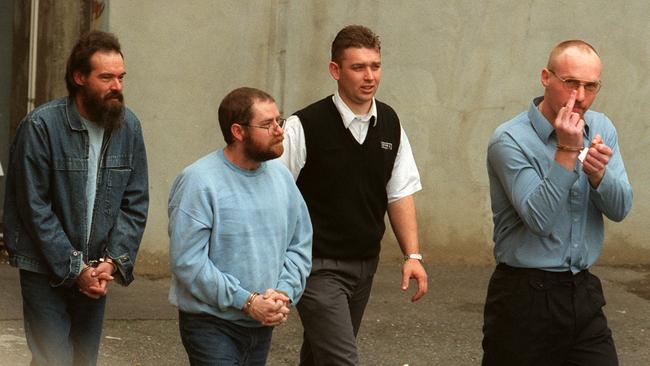Mark Haydon, the man who assisted the Snowtown serial killers, approved for release on parole
A decision has been made about whether to grant parole to Mark Ray Haydon – the man who helped cover up the “bodies in the barrels” serial murders.

Police & Courts
Don't miss out on the headlines from Police & Courts. Followed categories will be added to My News.
The man who helped cover up the “bodies in the barrels” serial killings will be released on parole ahead of the expiration of his sentence – but not into the community.
On Wednesday, the Parole Board announced it had signed off on Mark Ray Haydon moving to the low-security Adelaide Pre-release Centre ahead of his imminent release in May.
Board chair Frances Nelson KC said Haydon would be electronically monitored and, if granted day leave, subject to a curfew, but must live in the centre until his 25-year term ends.
She said the board had determined a period of monitored release would be beneficial to Haydon, to his victims and to the public, to ensure he can function safely in the community.
Ms Nelson also gave the first insight, in nearly three decades, into the mindset of the three men who committed Australia’s worst-ever serial killings.
Having interviewed them repeatedly and annually since their incarceration, she said:
RINGLEADER John Justin Bunting has shown no contrition, has “no empathy at all” and remains “proud to be a serial killer”.
STRONGMAN Robert Joe Wagner “does not come across as someone who’s contrite or remorseful”.
MURDERER James Vlassakis is eligible to seek release on parole next year but has yet to be assessed, as “prisoners don’t always turn up” to board hearings.
Ms Nelson said Haydon’s situation was very different to those of Bunting and Wagner.
“We have assessed his risk to the community, having regard to the psychological assessment done by the Department for Correctional Services,” she said.
“There has been no indication, throughout his 25 years in prison, that he has been inappropriate or aggressive or non-compliant … we have interviewed him at least twice.
“He described how he was drawn into this offending – which does not excuse it, but does tend to explain it.
“He had a shocking childhood, he was subjected to violence at a very early age … he was very much influenced by Bunting who exerted a very heavy influence on him.
“He was also, to some extent, fearful of Bunting and did explain to us that, at times, he was worried he would be the next victim and, if he did disclose what he knew, he would more than likely be killed.
“Haydon explained how he was, to some extent, in the thrall of Bunting.
“As I said, it doesn’t excuse it but, to some extent, it explains why he became involved in what was a dreadful series of crimes.”

On May 21, Haydon, 65, will complete his full 25-year sentence for having assisted in covering up the infamous serial killing spree.
He will then be released, without any form of supervision, unless the state government can convince the Supreme Court he is a high-risk offender who needs extended supervision.
On Monday, the government announced a legislative rewrite expanding the definition of high-risk offender to include persons convicted of assisting in a violent offence.
On Wednesday, Ms Nelson said the Parole Board met with Haydon on Tuesday night and, having refused his bid for parole in 2017, opted to approve it this time.
“It’s inevitable that he’s going to be released into the community on May 21, that cannot be avoided,” she said.
“We asked ourselves how we can best progress on (while) regarding the safety of the community and how Haydon can be transitioned to make this big change.
“Twenty-five years is a long time and the world has changed a lot … adjusting to the pressures of the outside world is a change (for prisoners).
“His institutional behaviour has been excellent throughout his incarceration, his compliance with prison rules and regulations has been such that we are confident he will comply with parole conditions.”

Under the terms of his parole, Haydon is required to:
LIVE at the Adelaide Pre-release Centre, which he may only leave with permission and within which he must reside between 9pm and 6am
WEAR an electronic monitoring bracelet at all times
ABSTAIN from drugs and alcohol
OBEY the orders of the Department for Correctional Services
NOT speak to the media
Ms Nelson said the board had considered the concerns expressed by the families of the killing spree’s victims when reaching its decision.
She said further consultation would be undertaken with them via the Commissioner for Victims’ Rights, Sarah Quick, as Haydon’s release neared.
That would include decisions about where Haydon would live and any parts of the state from which he should be excluded.
She conceded she had “some concern” for Haydon’s safety upon his “inevitable” release, but hoped there would be no “vigilante action”.
“We will have to see how he settles into the Pre-release Centre and what his progress is before we look at release into the community,” she said.
“Appropriate accommodation is an extremely difficult thing because we have a shortage of public housing … as a result, we find, the Department is putting people up in hotels.
“We always take the families of victims into consideration and, I imagine, the most dreadful effect (the murders) have had on them.
“We (on the board) have to review these files every 12 months and have done so for years, and reading them is particularly traumatic for a board member.
“I therefore cannot imagine how difficult it is for these families.”

Ms Nelson said those annual file reviews meant repeated contact with Bunting, who committed 11 murders, and Wagner, who committed 10.
“Bunting shows no contrition, I think he has no empathy at all,” she said.
“He has no insight into his offending, he’s quite proud of being a serial killer, he’s completely indifferent to the effect his crimes have had on anyone else.”
Wagner, she said, was “not quite as forthright” as Bunting “but he does not come across as someone who has become contrite or remorseful”.
She said she had not interviewed Vlassakis – who pleaded guilty to four murders, and gave evidence against the other killers – for some time.
“I think he is entitled to apply for parole next year … we haven’t interviewed him yet,” she said.
“Prisoners do not always turn up (to hearings) and I’m not going to comment on his file because I’ve not got it with me.”

Commissioner for Victims’ Rights Sarah Quick said the Parole Board’s decision had provoked “varied” responses from the victims’ families.
“Some are obviously feeling fearful, anxious and uncertain, others are absolutely supportive of Haydon’s release on parole,” she said.
“They feel that knowing he’s monitored and subject to parole conditions gives them an added sense of safety and security.
“I would certainly say that, regardless of their varied views, it’s going to take them all time to adapt to the idea Haydon will be living in the community, and what that means for their own routines, daily lives and freedom of movement.”
Despite the decision, Attorney-General Kyam Maher on Wednesday afternoon said he was hopeful legislation that had been “rushed through” to classify Haydon as a serious violent offender would pass the upper house by the end of this week.
“The government, before this decision, has already lodged an application with the Supreme Court for an extended supervision order that has the potential to see further conditions in place beyond the release date,” Mr Maher said.
He said anyone on an extended supervision order who breached its conditions would face the real possibility of being remanded in custody.
Mr Maher said he had every confidence the Parole Board – more specifically Ms Nelson – had all of the relevant information about Haydon before them when making a decision on parole.
“She’s been doing this for decades, she’s been appointed and reappointed by governments of every political persuasion, and is well regarded as one of the top legal minds in this state,” he said.
“The Parole Board would have all the information taken into account before them in written form. They can go back and look at it at any time.”




